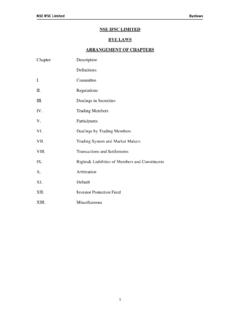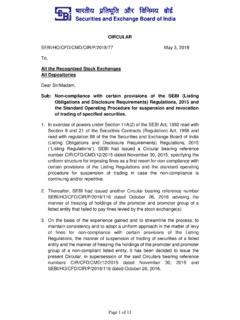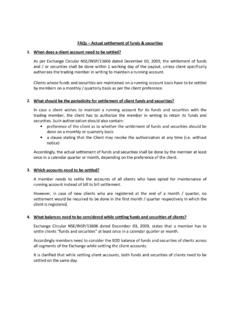Transcription of FAQs FOR NRI - TRADING ACCOUNT
1 1 faqs FOR NRI - TRADING ACCOUNT Q1 Who is a non-resident Indian (NRI)? Ans Non-Resident Indian (NRI) means a person resident outside India who is a citizen of India or is a person of Indian origin"[as per FEMA regulations] Q2 Can NRI invests in shares in India through a stock exchange? Ans Yes, NRI can purchase shares or convertible debenture of an Indian Company through stock exchanges, under the portfolio investment scheme on repatriation and /or non repatriation basis. Q3 Can NRI/PIO invests in other securities? Ans Yes, NRI/PIO can invest in other securities namely 1. Dated Government securities (other than bearer securities) or treasury bills. 2. Units of domestic mutual funds.
2 3. Bonds issued by a public sector undertaking (PSU) in India. 4. Shares in Public Sector Enterprises being disinvested by the Government of India. Q4 Are NRIs allowed to invest in Exchange Traded Funds (ETFs)? Ans Yes, NRIs are allowed to Invest in Exchange Traded Funds (ETFs). NRIs can invest in ETFs both on repatriation as well as non repatriation basis. Q5 How can NRIs invest in shares in India? Ans As per Reserve Bank of India (RBI) guidelines, NRI who wishes to invest in shares in India through a stock exchange need to approach the designated branch of any authorized dealer (bank) authorized by reserve bank to administer the PIS (Portfolio Investment Scheme) to open a NRE (Non Resident External) /NRO (Non Resident Ordinary) ACCOUNT under the scheme for routing Investments.
3 Q6 What is a designated bank branch? Ans Reserve bank of India has authorized few branches of each authorized dealer bank to conduct the business under portfolio investment scheme on behalf of NRIs. NRI can select only one authorized dealer bank for the purpose of investments under portfolio investment scheme and route the transactions through the branch designated by the authorized dealer bank. 2 Q7 What is a Portfolio Investment Scheme (PIS)? Ans Portfolio Investment Scheme (PIS) is a scheme of reserve bank of India under which - Non Resident Indian (NRIs) can purchase/sell shares/convertible debentures of Indian companies on Stock Exchanges under Portfolio Investment Scheme.
4 For this purpose, the NRI/PIO has to apply to a designated branch of a bank, which deals in Portfolio Investment. All sale/purchase transactions are to be routed through the designated branch. Q8 Who is a person of Indian Origin? Ans For the purposes of investments in shares/securities in India, person of Indian origin means a citizen of any country other than Pakistan or Bangladesh, if a) he at any time, held an Indian passport; or b) he or either of his parents for any of his grand parents was a citizen of India by virtue of the constitution of India or Citizenship Act, 1955 (57 of 1995); or c) the person is a spouse of an Indian citizen or a person referred to in clause (a) or (b) Q9 Who is an overseas citizen of India (OCI)?
5 Ans Under OCI Scheme operational from 02nd Dec 2005 government of India decided to grant overseas citizenship of India (OCI) commonly known as dual citizenship . A foreign national, who was eligible to become a citizen of India on or was a citizen of India on or at anytime after or belonged to a territory that became part of India after and his/her children and grand children, provided his/her country of citizenship allows dual citizenship in some form or other under the local laws, is eligible for registration as an Overseas Citizen of India (OCI). Minor children of such person are also eligible for OCI. However, if the applicant had ever been a citizen of Pakistan or Bangladesh, he/she will not be eligible for OCI.
6 Q10 Can PIO (Person of Indian Origin) as well as OCI (Overseas Citizen of India) also invest in shares in India? Ans Yes, PIOs and OCIs do have a parity with NRIs in respect of all facilities available to the NRIs in the economic, financial and educational fields except in matters relating to the acquisition of agricultural/ plantation properties. 3 Q11 What is an Overseas Corporate Body (OCB)? Ans Overseas Corporate Body means a company, partnership firm, society and other corporate body owned directly or indirectly to the extent of at least sixty percent by Non-Resident Indians and includes overseas trust in which not less than sixty percent beneficial interest is held by Non-Resident Indians directly or indirectly but irrevocably.
7 Q12 Can Overseas Corporate Body (OCBs) also invest in shares in India? Ans OCBs have been prohibited from making investments under Portfolio Investment Scheme. OCBs have been de-recognized as a class of investor entity September, 16, 2003. Further, the OCBs which have already made investments under the PIS are allowed to continue holding such shares /convertible debentures till such time these are sold on the stock exchange. Q13 What are the documents required to be collected from Investor to open a NRI/PIO/OCI TRADING ACCOUNT ? Ans List of documents to be taken while registering NRI/PIO/OCI Clients as may be applicable Document ensuring status of entity In case of Indian passport - Valid passport, Place of birth as India, Valid Visa Work/Student/employment/resident permit etc.
8 In case of foreign passport : Valid passport and any of the following Place of Birth as India in foreign passport Copy of PIO / OCI Card as applicable in case of PIO/OCI PIS Permission Letter from the respective designated bank PAN Card Overseas Address Driving License/ Foreign passport /Utility Bills/ Bank statement (not more than 2 months old)/ Notarized copy of rent agreement/ leave & license agreement/ Sale deed. Photograph of Investor. Proof of respective bank accounts & depository accounts. 4 Q14 What are other client registration formalities to be taken care while registering NRI/PIO/OCI Clients? Ans In case of NRI/PIO/OCI client registration documents are required to be executed by client himself and not by Power of Attorney Holder.
9 In case of In-person verification of such clients, the members may obtain from such clients KYC documents attested by any one of the following entities Indian Embassy/Consulate general in the country where the client resides, Notary Public, Court, Magistrate, Judge or Local banker. Q15 Is it mandatory for a client to provide local (Indian) address? Ans At the time of client registration, client needs to provide its foreign address along with documentary proof of the same. If client so desire it can keep its local address as correspondence address. In such scenario additionally they are required to provide documentary evidence in support of local address also. Q16 Can two separate TRADING accounts namely (NRE & NRO) can be opened by NRI?
10 Ans Yes, clients can have two separate TRADING accounts based on NRE & NRO. Q17 What are the additional requirement with respect to contract notes? Ans Contract notes in original for both purchase and sale transactions needs to be submitted with in the time specified by the designated bank to enable designated banks to report the same to Reserve Bank of India. Q18 What precautions TRADING member needs to take while dealing with NRI Clients? Ans TRADING member need to ensure that Securities are not in RBI ban list before executing the order. Clear funds are available for purchases. Securities are available before executing any sell order. Depending upon whether the purchases are made on repatriation / non-repatriation basis pay-out of the securities needs to be transferred to respective de-mat ACCOUNT .














